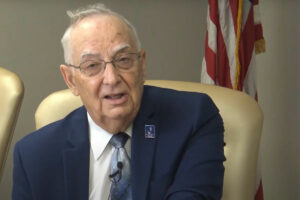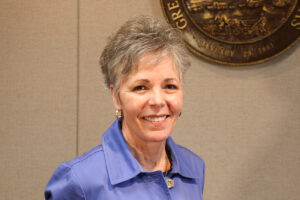Topic: Gannon v. State

Interview of Dale Dennis, August 28, 2020
Interviewed by Andy Tompkins
People interested in the development of education policy in Kansas will find no better resource than this 2020 oral history interview with Dale Dennis, Deputy Commissioner of Education. The interview was conducted by Dr. Andy Tompkins, a former Kansas Commissioner of Education. During the interview, Dennis speaks candidly about policy development, identifying the issues and the legislators who were intrinsically involved. The interview covers the 1972 lawsuit which was the first dealing with issues of equity in school funding. Twenty years later, a 1992 school finance lawsuit again challenged the lack of equalization which rendered the formula unconstitutional. Dennis explains Show Morein detail the process by which the Legislature, Governor Joan Finney, Speaker Marvin Barkis, and others went about addressing the Court's concerns. By 2000 the Legislature had again failed to fund the school finance formula fully and the Montoy lawsuit arose. Another case, Gannon, began in 2010. This time the problem was the adequacy of the funding to meet constitutional requirements. Moving on from school finance lawsuits, the interview covers school consolidation and related issues of local control. Dennis explains why he started offering budget workshops to school administrators, including the development of software and the use of computers. This interview includes a brief discussion of the 1999-2000 legislation that moved state oversight of community colleges and technical schools (later termed technical colleges) from the Kansas Department of Education to the Kansas Board of Regents. Show Less

Interview of Lawton Nuss, July 27, 2022
Interviewed by Richard Ross
Retired Chief Justice Lawton Nuss describes his attempts to be appointed to the Court of Appeals (he was not) and to the Supreme Court. Nuss served as Acting Chief during the illness of Chief Justice Davis. After becoming Chief Justice in 2010 he became the chief spokesman and administrator for the entire judicial branch of nearly 1600 employees and 250 judges. In 2014-15 he appointed a Court Budget Advisory committee to help resolve an eight million dollar budget shortfall. He discussed at length the legislative reaction to the Gannon v State school finance case which was Show Morefiled in 2010 and not finally resolved until 2019. Nuss describes his work with the conservative leadership in the state legislature, and a conservative governor, and their attempts to gain more control over the courts. He dealt with budget shortfalls that resulted in closing the courts; attempts to elect rather than appoint judges; and threats to change the role of the courts in the constitution. Nuss was a vigorous defender of the judicial system's independence against legislative interference. He cited the Supreme Court’s Solomon case which essentially answered the question, "‘Should the judicial branch have to give away some of its power granted directly by the people in their Constitution in order to get funding from the legislature.” The court's decisions on school finance continued to provoke the legislature during his tenure. Show Less

Interview of Thomas (Tim) Owens, October 14, 2022
Interviewed by Nancy Parrish
Owens described his career path from military officer to private attorney to city council member to the state legislature. He served seven years in the Kansas House and then ran for the Kansas Senate where he chaired the Senate Judiciary Committee. Owens recounts the pressure from Governor Brownback to change the merit selection procedure for judges, making them elected. Also, the education bills were now being sent to the Judiciary committee because of lawsuits and that also caused friction because of the court's decisions on resolving the Montoy and Gannon cases. Owens also dealt with Show Morea death penalty bill which failed 20-20. He described frequent trips "across the street" carrying messages between the Chief Justice and the Governor's office. He lost his bid for reelection to the Senate in 2012 and ended up teaching at Johnson County Community College and retired from the military as a full colonel. He even served a year as municipal judge in Lenexa. Show Less

Interview of Cynthia (Cindy) Lane, March 25, 2025
Interviewed by Mark Tallman
Cindy Lane's leadership has helped transform Kansas education to benefit Kansas children. This interview shows the impact she had on education policy, from special education to the Kansas Board of Regent's newest endeavor, the Blueprint for Literacy. This quote from Dr. Lane sums up the interview: "Most of my career in KCK as a leader was to focus on outcomes that actually transformed kids’ lives, that opportunity piece." From changes in special education , to court cases on school finance, to the Kansas Board of Regents, she is still working to transform kids' lives.

Interview of Alan Rupe, May 12, 2025
Interviewed by Mark Tallman
Rupe's interview provides an historical perspective on school finance and school finance litigation. Rupe and John Robb represented the plaintiffs in the Montoy and Gannon lawsuits After trying a lawsuit for the Newton School District, Mr. Robb suggested to Rupe that they try a suit against the state of Kansas over adequate and equitable funding of public education. Rupe said, "Count me In!" Since 1989 the two have partnered on school finance cases. In the interview Rupe discusses how earlier case judgments influenced their decision to move the focus of the litigation from the equal Show Moreprotection clause to Article 6 Section 6 of the Kansas Constitution and focus on the adequacy of school funding. There is a lot of detail in the interview about aspects of the litigation which continued for many years. Toward the end of the interview Rupe offers this idea: "... one of the lessons that we learned as a result of Montoy is if you declare victory and spike the ball in the endzone and turn your back on the issue, things don’t get better. The legislature and politics will start moving the money away from the schools." Rupe's conclusion is "It’s the language in the constitution that has pushed the results that we’re seeing." Show Less
